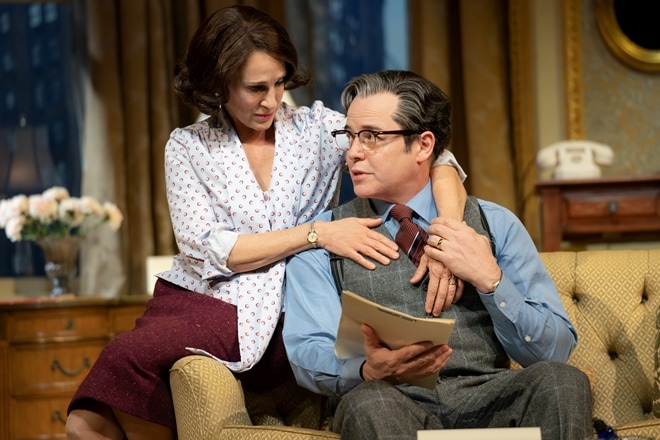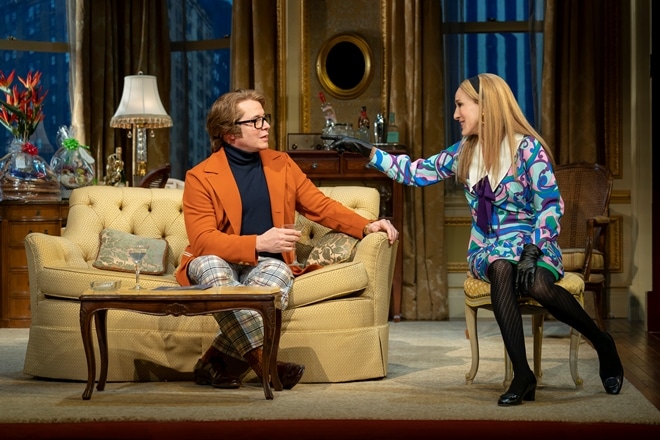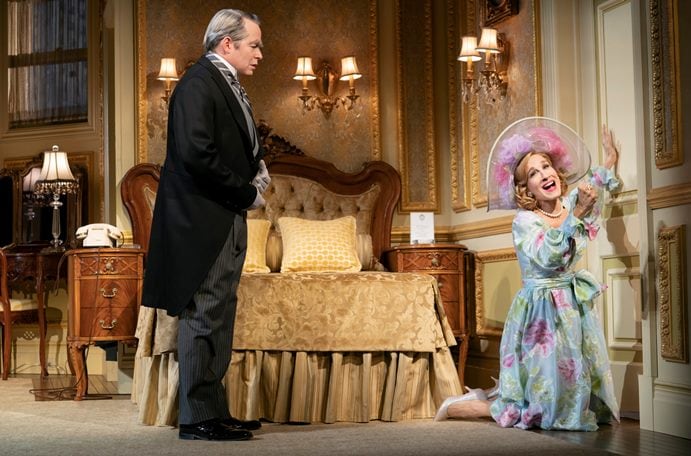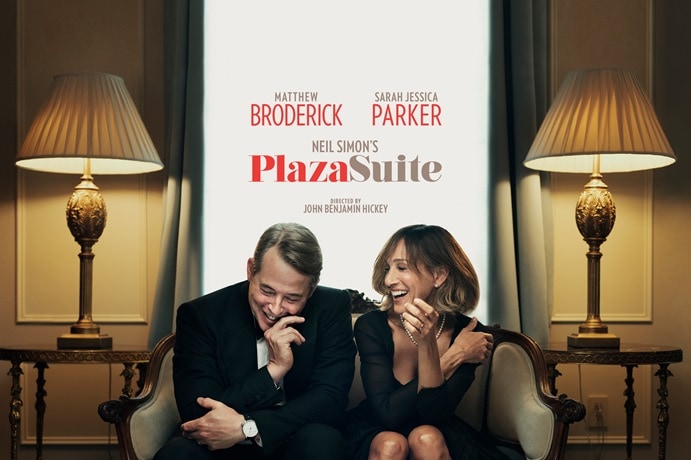With the name power of the late Pulitzer Prize and four-time Tony Award winner Neil Simon (with more than 30 plays and musicals to his credit) and the stage-and-screen star power of two-time Emmy winner Sarah Jessica Parker and two-time Tony winner Matthew Broderick (together on the Broadway stage for the first time in over 20 years), the current production of Plaza Suite at Broadway’s Hudson Theatre (the first revival of a Neil Simon play following his death in August 2018, at the age of 91, and the first-ever NYC revival of this 1968 comedy) is sure to attract a large enthusiastic audience. But does its half-century-old unhappily married humor still hold up in our present time? [Spoiler alert for those unfamiliar with the play: this review contains specifics about its contents and outcomes in the context of then and now.]

The suite of three one-act shorts, all set in Suite 719 of Manhattan’s historic five-star Plaza Hotel (the title is the wittiest of all the play’s lines), checks in on three different out-of-town couples, played by real-life spouses Parker and Broderick (married since 1997), in the midst of marital crises. Under the direction of Tony-winning actor John Benjamin Hickey, the pace picks up from one to the next, as the styles of the individual segments and the actors’ characterizations shift from painful tragicomedy to flirtatious sex farce to over-the-top slapstick while navigating the themes of conflict and infidelity, fear of aging and of a failing relationship.
In “Visitor from Mamaroneck,” the first of the trilogy, 40-something wife and mother Karen Nash has planned a romantic night back in their honeymoon suite with her workaholic husband Sam, to celebrate the 24th (?) anniversary of their wedding. But he has urgent business that can’t wait, so will be heading back to the office for most of the evening. Suffering from a toxic case of male menopause, he neglects, insults, and gives orders to the lonely, ditzy, and accommodating Karen, who talks too much to the bellhop and waiter, and can’t seem to remember her own age, the exact date of their marriage, or the number of the room they booked as newlyweds (admitting to the female stereotype that “math isn’t one of my best subjects”).
Despite his demeaning behavior, she remains desperate to rekindle the love they shared and to save her marriage – even after he confirms her suspicion that he’s having an affair with his secretary Miss McCormack, who first called, then showed up in their room. Zingers fly (“It’s so damned unoriginal . . . Everyone cheats with their secretary. I expected more from my husband”), as do pop-culture references (to the A&P, Metrecal, Trader Vic’s, and Jade East men’s cologne) that firmly set the story in 1968 (when, I might add, women constituted only 38% of the US workforce and their salaries were only 58% of what men made). He chooses to go on to his assignation, and she is left alone, not knowing if he’ll be back or what her future will hold. Funny.

The long first act is followed by “Visitor from Hollywood,” in which “Mr. Famous Hollywood Producer” Jesse Kiplinger, in NYC to sign Lee Marvin for his new movie, asks his old Tenafly, NJ high-school girlfriend Muriel Tate, whom he hasn’t seen in seventeen years, to join him in his room for a visit. Now a housewife and mother, the pretty, nervous, and starstruck Muriel is well-aware of his professional success, his reputation as a womanizer, and his three divorces, from “three of the worst bitches you’d ever want to meet.”
Though she equivocally insists she can’t stay too long and must get back to her car, appointments, husband, and kids (with times that keep changing and a marriage that becomes less and less happy), and he falsely insists that he had no ulterior motives in inviting her, he keeps making moves on her and she keeps delaying, talking, and downing vodka stingers, as they kiss, flirt, drop names, and dance their way into the bedroom, in a high-spirited story of welcome seduction in which no doesn’t mean no (and makes a travesty of today’s #MeToo and #TimesUp movements).

“Visitor from Forest Hills” concludes the suite with an increasingly exaggerated reliance on full-out physical comedy, as parents of the bride Roy and Norma Hubley frantically try to coax their daughter Mimsey, suffering from wedding-day jitters, out of the bathroom in which she has locked herself, to go downstairs for her pricey nuptials. Roy blames his wife for their daughter’s behavior, then tries every drastic measure he can think of to get her out, but to no avail. When the bride-to-be-or-not-to-be finally reveals her concerns about the institution of marriage and her reluctance to end up like her parents, they call her fiancé Borden to talk to her. He does, and she will, in yet another laughably dated example of an erratic woman given over to the control of a man.
Parker is a stand-out throughout the three acts, delivering distinctive portrayals of her characters, bringing a different voice and style to each of the central roles, along with her spot-on comic timing, hilarious movements, and expressive body language. Broderick captures the respective egos and accents of the three men, getting off to a slow start with the distant, unfaithful, and unlikable Sam, then ramping it up with the relentless sexually driven Jesse, and concluding with the sidesplitting (and tuxedo-splitting) physicality of the exasperated Roy, channeling both Vaudeville and the shtick of such legendary comics of the 1960s as Jerry Lewis, Mel Brooks, and others.
The leads are given fine support by the featured cast of Molly Ranson as Miss McCormack and Mimsey, Eric Wiegand as the bellhop and Borden, and Danny Bolero as the waiter. And a first-rate multiple Tony-winning artistic team recreates the authentic look and feel of the era, with a luxurious set design of the eponymous locale by John Lee Beatty (revealed by an actual “curtain up” – a rarity in the theater these days!), character-defining period-style wigs by Tom Watson and costumes by Jane Greenwood (the mod outfits of Jesse and Muriel are especially nostalgic and eye-catching), and incidental music by Marc Shaiman, with lighting by Brian MacDevitt and sound by Scott Lehrer.
If you can look at Plaza Suite as a period piece, and can overlook the cringeworthy outdated sexist tone of the humor (which is admittedly hard to do from a 21st-century feminist perspective), you might enjoy some sardonic retrospective laughs at the epitome of white privilege and the patriarchy, which, with historical hindsight, even seem antiquated for when it opened on February 14, 1968, in light of the Civil Rights Movement, the ongoing war in Vietnam, the founding of NOW in 1966, the Summer of Love in 1967, and the growing Women’s Liberation Movement. To quote another classic from the Sixties, “The Times They Are a-Changin’.” Let’s hope.
Running Time: Approximately two hours and 35 minutes, including an intermission and a pause.
Plaza Suite plays through Sunday, June 26, 2022, at the Hudson Theatre, 141 West 44th Street, NYC. For tickets (priced at $89-699), call (855) 801-5876, or go online. Everyone must show proof of full COVID-19 vaccination and a photo ID to enter the building and must wear a mask at all times when inside.






Due to positive COVID test results for stars Matthew Broderick and Sarah Jessica Parker, performances of Plaza Suite have been cancelled through Sunday, April 10, and an extension has been announced for an additional five performances through Friday, July 1.